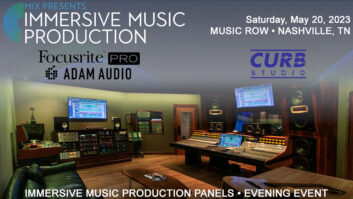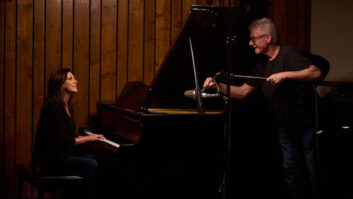Ben Folds (left) and Nashville Mayor Karl Dean (center) look on as National Trust’s David Brown announces Music Row’s status as a National Treasure. NASHVILLE, TN—Nashville’s storied RCA Studio A on Music Row caught the public’s eye in recent months as it narrowly escaped demolition, but the situation highlighted the need to preserve not just one facility but an entire district intrinsically tied to the city’s cultural history. That dream took another step towards reality on January 12, 2015 at a press conference held inside Studio A, when the National Trust for Historic Preservation named Music Row a National Treasure.

“Save Music Row” has been the rallying cry of musician’s voices seemingly in the wilderness, drowned out by the roar and diesel smoke from bulldozers and demolition equipment up and down the avenues that made Nashville famous worldwide. The country music heritage of Music Row and the buildings that recorded and broadcast it all over the globe seemed destined to be plowed under, serving as the foundations for condos and high-rise office buildings. Now that is starting to change.
Ben Folds, current occupant of RCA Studio A and owner of Grand Victor Sound studio in that space, acknowledged to the crowd of 200 music industry veterans, concerned citizens, realtors and historians that “So much has happened in the last few months [since the Save Studio A campaign began]. I’m just really very happy that the building is still here and that [studio manager and outspoken studio preservationist] Sharon Corbitt-House is not strapped to the front of it. It’s great that everyone has come together to help keep the musical identity of Nashville, which is the reason we live here.” That “coming together” was the focus of the meeting. Like a snowball rolling downhill, the momentum to not only save RCA Studio A, but the rest of Music Row and its history is certainly growing rapidly.
There was a long list of honored guests present, but none spoke so eloquently about the need for preservation as David Brown, the executive vice president and chief preservation officer of the National Trust for Historic Preservation. “Singers and songwriters have been telling the stories of life’s ups and downs for decades. Music Row has had its share of ups and downs just like the folks in the songs. But like so many of the characters in the country songs, Music Row has survived. At the National Trust, we feel it’s time to ensure that the story of the place that produced these classics is also known. As a native Tennessean who grew up with a deep love for this city, I am pleased to be here today to talk about Music Row as the heart and soul of country music.”
Ben Folds (left) and Nashville Mayor Karl Dean (center) look on as National Trust’s David Brown announces Music Row’s status as a National Treasure. Brown then officially announced that Music Row is to be recognized as one of the National Trust’s National Treasures, one of only 50 such designations in the United States. The National Trust is “the nation’s largest private organization dedicated to saving America’s historic places.” Brown alluded to a question that many Nashvillians, especially those in the music industry, have pondered for a long time. “Do we want to imagine Nashville without Music Row?” His answer was “Well, I don’t and clearly you don’t either.” He called attention to the fact that many cities would love to have what Nashville has and almost bulldozed. “This eclectic mix of buildings and businesses [on Music Row] has created a unique environment: the kind of cultural district that cities all across the world are spending millions of dollars to create as part of a creative economy. The amazing thing is that you have it here in Nashville, and you have it right now.” He added, “It matters how we build our communities and it matters how we preserve them. When we lose the places that matter to us, we lose more than buildings. We lose the sense of community and the sense of civic pride.”

To acknowledge the momentum that saving Music Row is gaining, Brown went on to thank corporate sponsors American Express and the Danner Foundation for their assistance in funding research of the history of Music Row, noting, “The story of Music Row hasn’t fully been told.” One of the goals of the National Trust and the Music Industry Coalition (MIC) is researching and telling that story. Other groups/ individuals that were on hand and have become involved are Historic Nashville, Metro Nashville Historical Commission, Metro Historical Commission Foundation, and individuals such Mayor Karl Dean, Trey Bruce, Aubrey Preston, Mike Curb, Chuck Elcan, Congressman Jim Cooper and more.
Mayor Karl Dean spoke about the attention the plight of Nashville’s Music Row has received in recent months in the New York Times, Forbes and Time, and said that Nashville “has always held true to its roots and its roots in music.”
Mike Kopp, chair of MIC, revealed that there will be a 50th anniversary celebration of RCA Studio A on the weekend of March 29th, 2015. He then wrapped the meeting in a manner befitting the music business. “The good news is that the studio is safe. The bad news? This is a working studio and Ben needs to get back to work, so enjoy chatting but leave quickly so the recording can continue. Socializing for a cause is great, but we have to get back to making music.”
Music Industry Coalition
mic.nationbuilder.com
National Trust for Historic Preservation National Treasures
savingplaces.org







